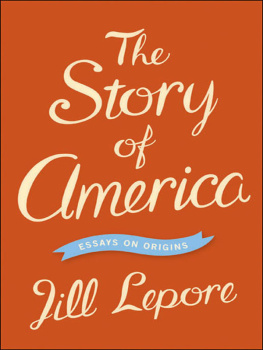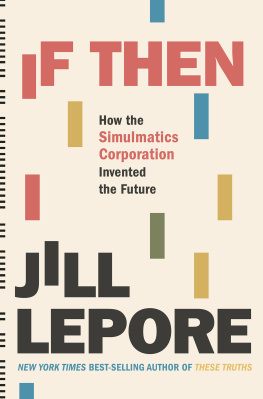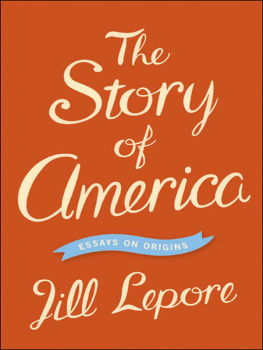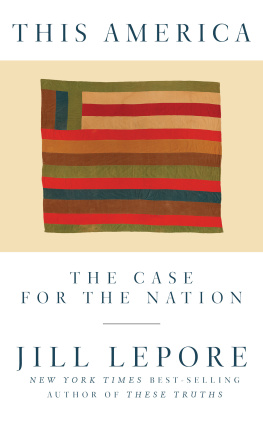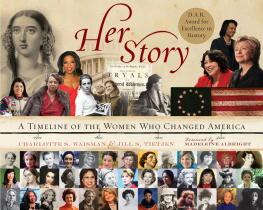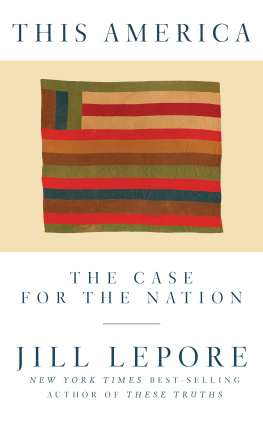Copyright 2012 by Jill Lepore
Requests for permission to reproduce material from this work should be sent to Permissions, Princeton University Press
Published by Princeton University Press, 41 William Street, Princeton, New Jersey 08540
In the United Kingdom: Princeton University Press, 6 Oxford Street, Woodstock, Oxfordshire OX20 1TW
Parts of this book appeared originally in The New Yorker.
Longfellows Ride is from The American Scholar 80, no. 1 (Winter 2011).
Copyright 2010 by Jill Lepore.
All Rights Reserved
Library of Congress Cataloging-in-Publication Data
Lepore, Jill, 1966
The story of America : essays on origins / Jill Lepore.
p. cm.
Includes bibliographical references and index.
ISBN 978-0-691-15399-5 (alk. paper)
1. United StatesHistorySources. 2. United StatesPolitics and governmentSources. I. Title.
E173.L47 2012
973dc23 2012016854
British Library Cataloging-in- Publication Data is available
This book has been composed in Adobe Caslon Pro and Trade Gothic
Printed on acid-free paper.
Printed in the United States of America
10 9 8 7 6 5 4 3 2 1
INTRODUCTION
In 1938, if you had a dollar and seventy-two cents, you could buy a copy of The Rise of American Democracy, a seven-hundred-page hardcover about the size of a biggish Bible or a Boy Scout Handbook. While a Bibles worth is hard to measure, the scout guide, at fifty cents, was an awfully good bargain and an excellent book to have on hand if you were shipwrecked on a desert island, not least because it included a chapter on How to Make Fire without Matches. But The Rise of American Democracy promised, invaluably, to make clear how Americans have come to live and to believe as they do. It is also a very good read. A Simple Book, its ad copy boasted. Paragraphs average three to a page. Sentences are short. Better yet: A Democracy Theme runs through the whole text.
The Rise of American Democracy was written by Mabel B. Casner, a Connecticut schoolteacher, and Ralph Henry Gabriel, a Yale professor of intellectual history, in 1937. In those dark days, with Fascism, not democracy, on the rise, Casner and Gabriel offered a wise and sober historians creed: We live today in perilous times; so did many of our forefathers. They sometimes made mistakes; let us strive to learn not to repeat these errors. The generations which lived before us left us a heritage of noble ideals; let us hold fast to these. Above all, they wanted students to understand the idea of democracy. But the book is also full of practical teaching tips and Real life activitiestested by Casner in her classroom in West Haven, Connecticutwhich, while not to be followed slavishly, were supplied at the end of every chapter, and included instructions for an end-of-year finale, a class play, The Rise of American Democracy: A Dramatization in Four Scenes, to be performed some cool June afternoon. It opens with a closed curtain:
Enter COLUMBIA from one side and BOY from Europe from the opposite side.
Boy. I am looking for Columbia. Do you know where I could find her?
Columbia. I am she.
Boy(bowing). I am happy and honored to make your acquaintance. I come from Europe. I have heard much of your democracy. I have come to you to find out what it is like.
Columbia. I shall be glad to show you. Perhaps the best way is to go on a journey through American history. (Exit both together)
The curtain rises on the Constitutional Convention, where Columbia and the earnest young European watch the delegates conclude their deliberations. Next, Columbia takes her awestruck European student of democracy to the Western plains in the 1840s to witness a shambles of bedraggled pioneers scuffle across the stage in the plays pitched climax, which combines singing, cowboy costumes, and even parts for pets, as per the sociable stage direction: dogs may be added.
I understand that they are settling your great continent, the boy says, but I do not understand what they have to do with democracy.
They have only a few belongings and simple tools, Columbia points out, but They are building a democratic nation. Men do not have to have possessions to do great things.
No matter if the scenery toppled, if the pioneers tripped in their boots, if the dogs barked and bayed; everyone in the audience was treated to a concise restatement of the then-dominant interpretation of the rise of American democracy: that it was fueled by the settling of the frontier and that it chiefly involved the hardscrabble striving of the poor.
What accounts for the rise of American democracy? Casner and Gabriel tried to answer that question by staging a play, by telling a story. That was a good idea. The United States got its start as a story. It begins: When in the course of human events. It has a moral: All men are created equal. It even has a villain, George III, on whose machinations the plot turns: The history of the present King of Great Britain is a history of repeated injuries and usurpations, all having in direct object the establishment of an absolute Tyranny over these States.
To say that the United States is a story is not to say that it is fiction; it is, instead, to suggest that it follows certain narrative conventions. All nations are places, but they are also acts of imagination. Who has a part in a nations story, like who can become a citizen and who has a right to vote, isnt foreordained, or even stable. The storys plot, like the nations borders and the nature of its electorate, is always shifting. Laws are passed and wars are fought to keep some people in and others out. Who tells the story, like who writes the laws and who wages the wars, is always part of that struggle.
Consider the Declaration of Independence. In March 1776, two months before John Adams was appointed to serve with Thomas Jefferson, Benjamin Franklin, Robert Livingston, and Roger Sherman, on a committee charged with drafting a declaration of independence, Abigail Adams wrote a letter to her husband. I long to hear that you have declared an independency, she began.
And, by the way, in the new code of laws which I suppose it will be necessary for you to make, I desire you would remember the ladies and be more generous and favorable to them than your ancestors. Do not put such unlimited power into the hands of the husbands. Remember, all men would be tyrants if they could. If particular care and attention is not paid to the ladies, we are determined to foment a rebellion, and will not hold ourselves bound by any laws in which we have no voice or representation.
Adams wrote back in April. As to your extraordinary code of laws, I cannot but laugh, he began. We have been told that our struggle has loosened the bonds of government everywhere; that children and apprentices were disobedient; that schools and colleges were grown turbulent; that Indians slighted their guardians, and negroes grew insolent to their masters. But your letter was the first intimation that another tribe, more numerous and powerful than all the rest, were grown discontented. He refused to take her storyabout the rule of men over womenseriously. Depend upon it, he resolved, we know better than to repeal our masculine systems.


